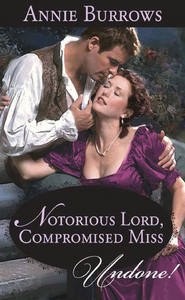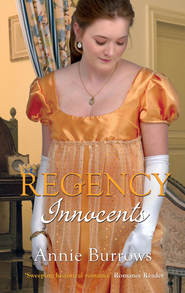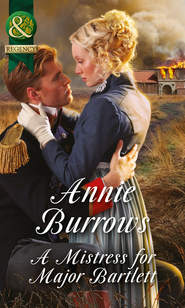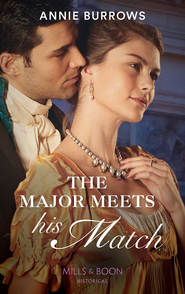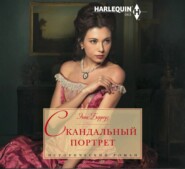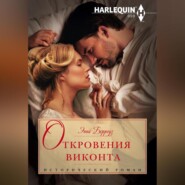По всем вопросам обращайтесь на: info@litportal.ru
(©) 2003-2024.
✖
Never Trust a Rake
Настройки чтения
Размер шрифта
Высота строк
Поля
But no man, not even one as immune to fellow feeling as people often accused him of being, could fail to be moved by her plight. She had come out here to indulge in a private fit of tears, only to find herself obliged to have her breakdown exposed, and, to crown it all, to have not only her own character, but that of her chaperon quite unjustly ripped to shreds.
‘She is wearing a purple turban,’ she hissed in an undertone, ‘with one white and one purple ostrich feather in it. You really cannot miss it.’ And then, snatching her hand from his, she said, ‘I think it would be for the best if I wait out here.’
‘Yes, indeed,’ put in Miss Waverley in a sugary-sweet voice. ‘You would not want to walk across that ballroom, not as you are. You really need to give your face a good wash before you let anyone see you.’
Miss Gibson hastily swiped at her cheeks with the backs of her hands. The effect, since her gloves were as badly soiled as her gown, was unfortunate.
‘Allow me,’ he said, producing a square of monogrammed white silk from his tailcoat pocket with a flourish and offering it to her.
‘Thank you, sir,’ she said gruffly and proceeded to take it from him with such reluctance that he suspected she would have refused it altogether were she not so desperate.
Why was that? he wondered. If she had taken a dislike to him, as seemed to be the case from the way she glared at him, after blowing her nose with a very unladylike thoroughness, then why had she come to his aid in the first place?
Or perhaps, as she had stated, it was just that she did not like to have any gentleman see her in such an unbecoming state of distress.
That must be it.
He turned, satisfied that he had accounted for the unwarranted hostility he could detect in her attitude, and made his way along the terrace, back to the ballroom.
Now all he had to do was find a woman of advancing years, in an ostrich-feathered purple turban, pass on the information that Miss Gibson was outside awaiting her assistance and he could lay the whole matter to rest.
Although he could not quite shake off an unfamiliar feeling of wishing he could do something to alleviate Miss Gibson’s distress. He’d realised, in the instant the threat of becoming leg-shackled to a creature of Miss Waverley’s calibre loomed before him, that he would rather die than face a marriage such as the one endured by his own father. And he was becoming more and more convinced that Miss Gibson had intervened to save him from just such a fate.
That must be it. She could not bear to see anyone forced into a marriage that was not of their own choosing.
Perhaps that was why she was out here crying. From what Lady Chigwell had said, she was not from a very good family. Perhaps she was being coerced to marry ‘well’ in order to advance their social standing. Perhaps that was what she was doing here tonight. Being put on display, to be sold off like a slave at auction. He had not seen her at her best just now, but her very youth, her very vulnerability, would hold enough appeal to interest several men he knew who were casting about them for wives this Season. It was the way of the world. Older men with money and status could more or less have their pick of the young virgins who came up to town each year to find a husband. The families of said virgins practically sold them off to the highest bidder, no matter what their feelings.
Denied choice in the matter, they eventually rebelled and took lovers of their own choosing.
Having freedom of choice was the one benefit that, as a man, he had which many women were not permitted. And he’d almost thrown it away.
It had been Miss Waverley who had shocked him out of the apathy that had almost led him to make a disastrous error. He held such cynical views of marriage that he’d been on the verge of allowing fate to take the choice out of his hands. Like a gambler, who tossed a coin to determine his next move. He’d thought it would simplify things to remove the element of choice from the equation. No such thing. Marriage, once entered into, was an inescapable bond. Reluctance to enter that state did not excuse a cavalier attitude towards the choice of bride. Though he still could not imagine finding any real pleasure for himself, in marriage, he owed it to his children to thoroughly investigate the character of the woman who would bear them. He would never knowingly foist a parent like his own mother upon poor innocent children. Nor a woman like Miss Waverley.
She might have jolted him out of his fatalistic attitude this evening, but it was only because she epitomised all he most despised in females.
He felt no gratitude towards her whatsoever. And yet, in spite of her intervention being quite unnecessary, the fact that Miss Gibson seemed to have acted out of concern for him did make him feel as though he wished he could repay her in some way.
For nobody, male or female, had ever attempted to rescue him from anything.
Good God. He stood stock still, smiling with unholy mirth at the thought that suddenly struck him. He’d just been rescued by a damsel in distress.
Not that anyone could, by any stretch of the imagination, think of him as a knight in any kind of armour. He fought his battles in the House of Lords, with cutting words rather than at tourneys, with lance and mace.
He turned, he was not entirely sure why, to take one last look at her—and caught Miss Waverley shooting her a look of pure venom.
He’d already ascertained that she was amoral and ruthless. And though Miss Gibson clearly possessed a great deal of courage, she appeared to be socially inferior to the scheming Isabella. Which rendered her vulnerable to the kind of attack he had no doubt the girl would launch at the first available opportunity.
He had wondered how he might repay Miss Gibson for helping him preserve his liberty. Now he knew. Over the next few weeks, at the very least, he would keep a discreet watch over her.
Or heaven alone knew what twisted form of revenge the thwarted Miss Waverley would exact.
Chapter Two
Another day in London.
Henrietta looked out of the drawing-room window at the row of houses across the street from the one her Aunt Ledbetter inhabited, repressing a sigh.
Too many buildings squashed together, too many people thronging the narrow streets, too much noise and bustle, and an overpowering concentration of smells. She had only been here just over a month and already she longed for the peace and quiet of Much Wakering: the wide skies, the sound of birdsong and the scent of blossom.
From her bedroom window she could see just one tree, if she hung out over the windowsill and craned her neck. One miserable, stunted sapling that looked as out of place in its environment as she felt.
‘What did you think of the performance, Miss Gibson?’
Henrietta started and pulled her attention back to her aunt’s guests. Or at least, the one guest who was trying to include her in a conversation to which she had not been giving her full attention. She had hoped that going to sit on a chair on the fringes of the room would have been enough to deter people from obliging her to talk. But Mrs Crimmer was not an easy person to deter from any course upon which she set her mind.
‘The performance? Oh, I, um …’ They had gone to the theatre the night before. In truth, if she were in a better frame of mind, she would have enjoyed the spectacle. But ever since Miss Twining’s ball there had been a cold lump of misery lodged just beneath her breastbone, which not even the most skilled of clowns could alleviate, and a fog of depression hanging round her through which everything she saw seemed grey and unappealing.
As unappealing as she knew herself to be.
The only thing that managed to make her haul herself out of bed in the mornings was the knowledge that if she lay there all day feeling sorry for herself, her aunt would worry. Mrs Ledbetter had done so much more than just accept the responsibility when her father had written to his cousin to ask if she might supervise a Season in London. Mrs Ledbetter had flung herself into the task with an enthusiasm which had taken Henrietta by surprise. At first, she’d been inclined to feel a bit offended by the way ‘Aunt’ Ledbetter had shaken her head and clucked her tongue as she’d watched the maid unpack her clothes. But then she’d never had a female relative supervise her wardrobe, at least not since her mother’s death so many years ago. And any offence soon melted away under the discovery that Mrs Ledbetter did not just enjoy shopping for clothes, but derived enormous pleasure from discovering which colours or styles became her the most. When she wasn’t taking her shopping for garments and all sorts of accessories Henrietta had no idea were absolutely essential, she had hired people to round her off in other ways. A friseur had come to the house to cut and style her hair. A dancing master visited regularly to teach her the steps of all the dances she had always wished she might be able to do, but had never had the opportunity to learn.
And her kindness continued, day after day. She organised trips to the theatre or the latest exhibitions, and took her to musical evenings and dinner parties where she introduced her to all her friends and acquaintances. Nothing was too much trouble. And, considering her own daughter Mildred was at an age to be considering matrimonial prospects herself, she might easily have treated Henrietta as a rival, or a threat, or even just an imposition.
Neither mother nor daughter had done any such thing. They had welcomed her into their circle with open arms.
For their sakes, Henrietta drew on all her reserves of will-power and mustered up a wan smile.
‘We have nothing like it in Much Wakering, Mrs Crimmer,’ she said quite truthfully. ‘So many talented acts, one after another. It was quite, um …’
‘Overwhelming, was it, my dear?’
Mrs Crimmer, the wife of one of Mr Ledbetter’s business contacts, nodded her head in a sympathetic manner. People who lived in London all year round, she had swiftly discovered, tended to look upon provincials with a mixture of pity and contempt.
If Mrs Crimmer had spoken so patronisingly to her three days ago, she would have made a withering retort. Or at least, she corrected herself, she would have bitten one back, for the sake of Mildred’s prospects. For Mr and Mrs Ledbetter were hoping that Mildred would look favourably upon young Mr Crimmer’s suit.
She glanced across the room to where the red-faced young man was paying court, rather bashfully, to Mildred, while Mildred was looking decidedly unimpressed.
Her aunt and uncle, for so she had come to think of them, might have hopes in that direction, but Mildred was looking for more from life than a prosaic match to cement a business alliance. She was looking for romance.
But then Mildred was pretty enough to have romantic aspirations. She had lovely golden hair, wide green eyes and a delicate little nose that made her look like an angelic kitten.
Perhaps that was why they had all accepted Henrietta into the household so readily, she sighed. With her gawky figure and plain face, she posed no threat to her distant cousin. When the pair of them walked into a room, all masculine attention went to Mildred.
Which had not bothered Henrietta in the slightest. She did not want masculine attention. Or at least, she had only ever hankered after the attention of one man.
But even he was beyond her reach now. Three nights ago, he’d finally forced her to accept the fact that she’d been a complete fool to follow him to London. And now she could no longer even pretend to herself that, deep down, she did mean something to him.
She could never have meant anything to him, for him to treat her as he had. She reached out and took a biscuit from the plate set on the table between her and Mrs Crimmer.







